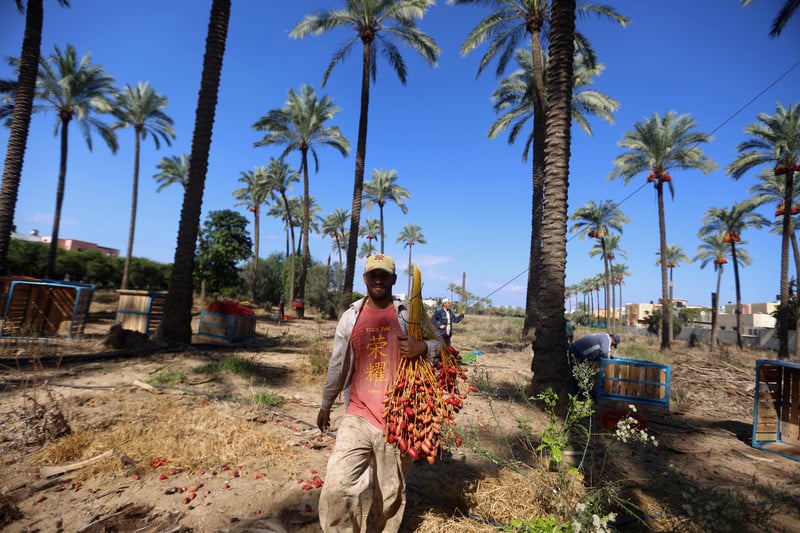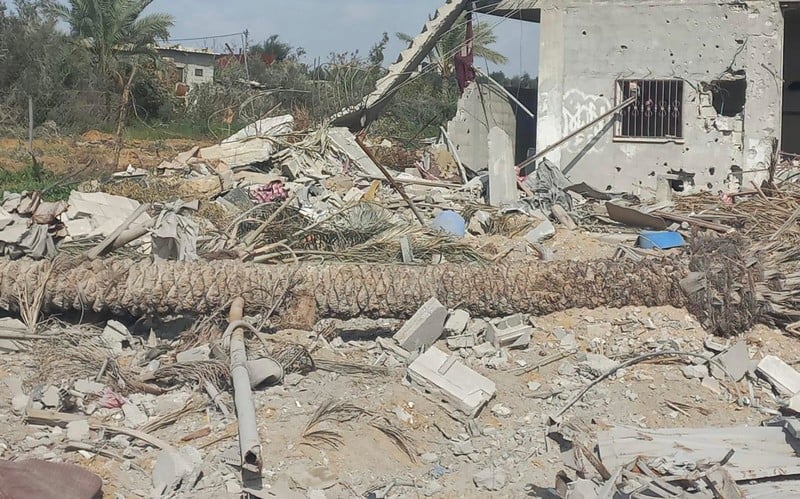Not just genocide but deliberate ecological disaster
30 March 2024

A man harvests dates from Gaza’s palm trees in 2017. Israel’s genocide in Gaza has caused huge ecological damage, with tree cover and farmland dramatically diminished and ground water polluted with munitions and toxins. Atia DarwishAPA images
In the verdant embrace of Khan Younis, our home stood as a testament to life’s enduring beauty. Our garden bloomed with vitality, a vibrant tapestry woven from the whispers of olive groves and the gentle sway of palm trees.
But where once laughter danced upon the breeze, now only echoes of devastation linger.
In December, my family and I fled our home, where souls lingered in the fragrant whispers of basil and mint, in the cool shade of jasmine trees clinging to crumbling walls, to take refuge in Rafah.
Israel’s genocidal military was coming closer and amid the thunderous roar of heavy bombardment we were forced to leave behind more than just bricks and mortar.
In our absence, Israeli tanks rumbled through the streets of our small town, just southeast of Khan Younis city, tearing through the fabric of our existence.
Each home in our neighborhood boasted a piece of land where families tended to their crops with loving care.
To us, these lands were more than just fields; they were a source of sustenance, a connection to our heritage, and a testament to the resilience of our people.
I remember the days when our land, considered sacred in its agricultural abundance, flourished with life. The garden boasted five majestic palm trees, weathered sentinels over a paradise of lemon and jasmine, a lemon tree, two olive trees, a shade tree by the door, and basins of mint and basil.
Every year, we planted various crops like zucchini, peppers and spinach.
I yearn for the familiar sight of our eldest palm tree, and the gentle melody of the nightingale’s song that once greeted me whenever I returned home.
Now, as I find myself displaced, the simple act of going home is a distant dream.
My father once told me that his father had tended our oldest palm like it was his child.
“So I love it even more dearly, for it is a living legacy of his care and devotion,” my father said
I watched as he lovingly tended to the grove of palm trees, each movement a testament to a bond forged over generations. In the palm trees’ graceful sway, I saw traces of my ancestors, their spirit intertwined with the roots that anchored them to this sacred land.
Amid the chaos
Amid the chaos, Zarifa, the oldest woman in the neighborhood, who had stayed home with her nephew Imad and his family, fell victim to Israel’s merciless onslaught.
She was shot twice by snipers while walking in the very early morning. They shot her despite her disability. Imad’s family gave her first aid as best they could before fleeing, crying for help.
Their pleas for help were met with the deafening silence of indifference.
It fell upon the shoulders of some brave youths to rescue Zarifa. Yet even their valor could not shield her from the relentless onslaught of destruction.
Hajji Zarifa succumbed to her wounds a few days later.
Days turned to weeks, and still, the specter of uncertainty loomed over our shattered land. And then, on one fateful day in January, some returned to Khan Younis, hearts heavy.
What greeted them was a scene of utter devastation, a landscape scarred by the ravages of war.
Homes lay in ruins, their once-proud facades reduced to rubble by the relentless onslaught of Israeli tanks. And amidst the wreckage, our beloved garden lay barren and lifeless, its once vibrant beauty now a distant memory.
But it was the sight of our oldest palm tree, its proud silhouette now a fallen monument to defiance, that pierced us to the core.

The trunk of the author’s oldest palm tree lies in the middle of the rubble. Photo courtesy of the family.
For my father, Shehadeh, 66, it was a wound that cut deeper than any mortar shell could. His tears, silent witnesses to the agony of loss, flowed freely as he gazed upon the remnants of a life once cherished.
Yet, as we labored to reclaim our land from the grasp of occupation, the specter of Israeli ecological apartheid loomed large over our efforts. Statistics paint a grim picture of destruction. Nearly half of Gaza’s trees and farmland have been laid to waste.
Olive groves have been flattened, and groundwater has been poisoned by munitions and toxins.
And while Khan Younis has yet to issue its own statistics, the devastation wrought upon our beloved palm tree speaks volumes to the scale of destruction that has befallen our land.
Since 1967, Israel has felled approximately one million olive trees, leaving behind a barren wasteland where once life flourished.
It is a deliberate strategy, designed to sever our connection to the land and erase the very essence of our existence. But even as the scars of war mar the landscape, the spirit of resistance burns bright.
The struggle for the land of Palestine is not just a battle for territory, but a fight for the very soul of our identity. And though the road ahead may be fraught with hardship and sacrifice, we remain steadfast in our determination to reclaim what is rightfully ours.
For as long as the olive trees continue to stand and the palm trees still sway in the breeze, the spirit of Palestine will endure, a testament to the resilience of a people who refuse to be silenced.
Bashaer Muammar is a Palestinian activist and translator from Gaza.
Not just genocide but deliberate ecological disaster | The Electronic Intifada